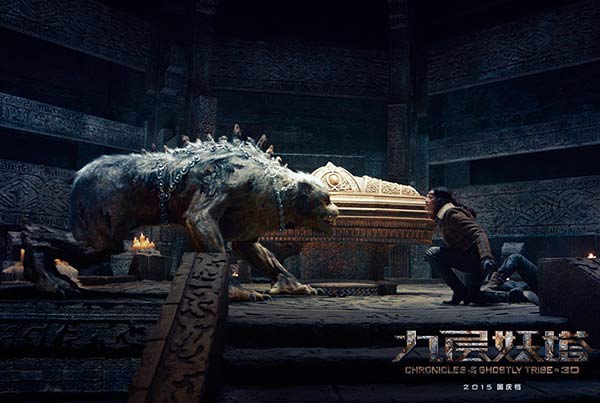
The National Day week has provided rich pickings for local filmmakers with homegrown movies overcoming competition from Hollywood, Xu Fan reports.
The challenge from Hollywood has been a longtime concern for Chinese filmmakers.
But the overwhelming box office returns for domestic titles in the just-concluded National Day holiday period have cheered them immensely.
The takings for homegrown movies on the first day of the holiday, Oct 1, was 302 million yuan ($47 million) or 95 percent of the 315 million earned that day. It was also up 54 percent from the single-day record of 205 million yuan for the same period last year.
On Wednesday, the figures from box-office tracker Cbooo.cn showed that the takings for the past seven days, a traditional golden week for theaters, were nearly 1.8 billion yuan, up 67 percent from last year's 1.08 billion yuan.
From Oct 1 to 3, the charts were led by the road comedy Lost in Hong Kong, which brought in 1.45 billion yuan. It was premiered across the country on Sept 25.
The film's strong box-office haul is not a surprise for industry watchers as it is the sequel to Lost in Thailand, which earned 1.27 billion yuan in 2012, making it the highest-grossing Chinese movie in two and a half years. The record was broken by the live-action animated movie Monster Hunt in mid-September.
While part of its success can be attributed to the earlier movies-Lost on Journey (2010) and Lost in Thailand (2012)-
the new movie has a stellar cast.

Lost in Hong Kong is backed by Enlight Media, one of the country's entertainment giants.
Months of promotion and eyecatching events such as an underwear show featuring foreign models also helped the movie.
With 12 box-office records broken in its first week, including for the opening day and single day, some industry sources say that Xu Zheng's second directorial work could dethrone Monster Hunt and become the top-grossing movie in the history of Chinese cinema.
Its biggest rival was Lu Chuan's Chronicles of the Ghostly Tribe, a sci-fi adventure adapted from the best-selling novel, Ghost Blows Out the Light, or Gui Chui Deng.
The tomb-raider novel's popularity is believed to be behind the movie's success. The novel has sold more than 13 million copies.
Since opening in theaters on Sept 30, the movie starring Taiwan idol actor Mark Zhao has raked in nearly 500 million yuan.
It was second to Lost in Thailand on the box office chart from Sept 30 to Oct 3.
The midpoint of the holidays usually sees a drop in ticket sales and screenings, but on Sunday there was a change in fortune for Lost in Hong Kong.
The low-budget comedy Goodbye Mr Loser beat Lost in Hong Kong to top the box office despite the fact that the 212 million yuan grossed by Lost on its opening day was almost tenfold the 23 million yuan grossed by Goodbye at its premiere on Sept 30.

On Wednesday, the coming-of-age comedy was being shown on nearly 30 percent of all screens in the country's 5,800 cinemas, and had generated 48 percent of the box office takings. It had debuted with 12 percent of all screens.
With takings of 518 million yuan after eight days, Goodbye could become the unexpected star of the National Day holiday period.
Many critics attributed its rise to word-of-mouth marketing by moviegoers who saw the movie in the first few days.
The movie is an adaptation of a namesake stage play.
Goodbye scores a high 8.4 out of 10 on Douban.com, the country's most populous online film review platform. In comparison, Lost scores 6.3 and Chronicle gets 4.8.
"I was surprised, shocked and delighted to see a quality comedy such as Goodbye though the director and actors are all strange names to me," novelist Han Han told his 42 million followers on Sina Weibo, the Chinese equivalent of Twitter.
The three Chinese blockbusters have seen a comparatively weak challenge from the latest Hollywood offering, Pixar's fantasy animated film Inside Out.
The Hollywood movie could only manage the fourth spot with a total box-office collection of 40 million yuan. It was released on the Chinese mainland on Tuesday, nearly four months after its North American premiere.
Says Xu, the director and lead actor of Lost in Hong Kong: "If Chinese movies are tailored for homeland viewers I believe we can beat our Hollywood rivals."
Critics have said that the makers of Lost and Goodbye have featured themes like the middle-age crisis, the nostalgia of youth and "first love" to win over local moviegoers.
Meanwhile, moviemakers, especially those behind comedies, are switching their promotional efforts to second-and third-tier cities, which are seeing a rapid rise in the number of moviegoers.





